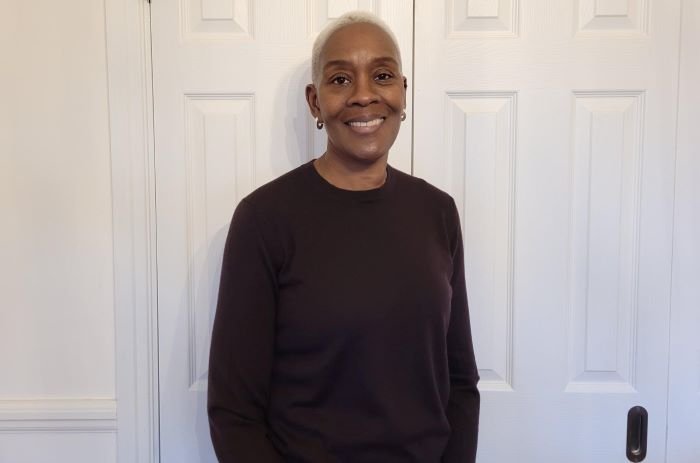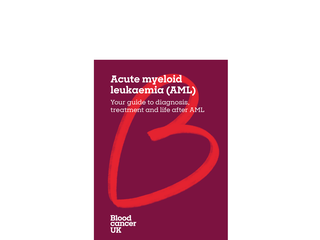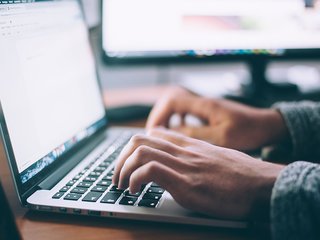Finding people who understand what you've been through
When Yvonne finished treatment for AML, she valued the support of the patient community in reassuring her that her worries were normal. She and other blood cancer patients support and encourage each other, knowing that help is just at the end of the phone.

Yvonne, diagnosed with AML
After treatment, I needed someone to hear and validate the realities of what I’d been through
At first, I didn’t feel like I needed emotional support. I was just trying to get through my own cancer journey and work out what treatments I was on when, and what was happening to my body. But more recently, after my treatment ended and I’ve been in remission, I joined a support group online. I also have a WhatsApp group chat where I talk to other people going through blood cancer.
Seeking support for myself in the patient community has given me a chance to share all my worries and feel reassured that I’m not alone in experiencing them.
We discuss all sorts of things – we remind each other to be patient with ourselves and not to expect our bodies to magically bounce back from cancer, and to be kind to ourselves bearing in mind what we’ve been through. Some days are just about sounding off and saying that we wish we didn’t have to go through this. Others are there to remind us of how great we are doing. It’s a place to be honest and share the realities of this illness.
Being part of the patient community has helped in so many different ways
We talk about being on this team that we wouldn’t have chosen to be on, but that now we’re on it, we’ve met some amazing people and it’s opened up new opportunities and ways of seeing the world. I now share my story so that it may help someone else. I’ve been involved in giving my input on a Blood Cancer UK patient panel and I volunteer with the African Caribbean Leukaemia Trust (ACLT). I’ve also done an oncology massage course so I can give back to the community.
Whilst I would never have wished for the experience, going through blood cancer has shifted my perspective and given me the impetus to do things that before I would have only spoken about and never got around to doing. Being part of the patient community has helped me recognise this.
When you’re struggling and feeling alone, talk to people. The worst thing we can do is to hold onto our fears or questions and try to solve it ourselves. The reality is we don’t know, we have no idea. This patient community has so much good advice, and tips for coping with hospital and advocating for yourself.

Yvonne helped create this guide to AML
She shares lots more tips in the booklet. The guide covers diagnosis, treatment, coping with AML and life after AML.
With a diagnosis like AML, you’re not expected to know what’s going on, so turn to others for help.
Remember too that your journey is unique. Others can support you and help you, but your medical team know what’s happening for you as an individual. Ask the nurses and doctors questions, jot down your concerns before appointments, so that when you see them next you’ve got your list of questions ready. Don’t be afraid to ask again and again if it’s sometimes too much to take in at once. Couple this medical advice with the support of the patient community, and you’ll be better able to tackle your journey with blood cancer..
The end of treatment doesn’t mean it’s all over – other patients understand this.
With my family, I tried to stay optimistic and positive within myself to make it easier for them to cope with what we were going through. I felt terrible for my family having to see someone they love go through such an illness and I could see how helpless they felt. I was worried for them and wanted to make sure they got any support they needed too.
My daughter and I were reflecting the other day on the blood cancer experience, and she was saying that for her it seems like such a long time ago. For her and others they can look back to ‘the time that mum had cancer and chemo’. For them, it was an isolated period and for all intents and purposes, the cancer is done and dusted. I think most people probably see it like that, but for me it isn’t yet over.
I think the only people who will get that are those in the patient community, as they understand the longer lasting effects.
One of my main worries has been about relapsing. I’ve been paranoid about a relapse and from speaking to others, I know it’s a common theme. My groups get that, they know it’s not mentally over and we are there to support each other in the meantime.
I first experienced the patient community when I was on a ward with four other women. We talked about our blood cancer experiences and we saw day to day our shared life with blood cancer. It was good to talk to people who understood and to have that shared experience, although I found it important to also remember that while we had lots in common, we were all on our own journey with blood cancer and our bodies could all behave differently.
This balance between seeking support and reassurance from other patients, but at the same time recognizing my own journey and listening to the medical information from my doctors, has been the key to getting the most positives out of the patient community.

Talk to other people affected by blood cancer
Hear from and connect with people who understand.
